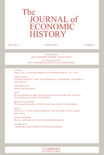
JOURNAL OF ECONOMIC HISTORY
Scope & Guideline
Advancing Knowledge Through Economic Narratives
Introduction
Aims and Scopes
- Interdisciplinary Approach:
The journal employs an interdisciplinary methodology, merging economics with history, sociology, and political science to provide comprehensive insights into economic developments. - Focus on Economic Institutions:
A core area of study includes the evolution and impact of economic institutions, such as banks, markets, and government policies, on historical economic performance. - Analysis of Economic Crises:
The journal frequently examines historical economic crises, their causes, consequences, and the lessons they offer for contemporary economic challenges. - Cultural and Social Influences on Economy:
Research often explores how cultural, social, and political factors influence economic practices and institutions, highlighting the complexity of economic history. - Quantitative and Qualitative Methodologies:
The journal publishes studies that utilize both quantitative data analysis and qualitative historical narratives, allowing for a rich understanding of economic phenomena.
Trending and Emerging
- Impact of Globalization:
Recent papers increasingly analyze the effects of globalization on historical economic structures, reflecting contemporary concerns about global interdependence. - Economic Inequality:
There is a growing focus on the historical roots and evolution of economic inequality, a theme that resonates with current social justice movements. - Environmental Economics:
Emerging studies examine the historical relationship between economic practices and environmental impacts, particularly in the context of climate change. - Digital Humanities and Data Analysis:
The use of digital tools and methodologies for analyzing historical economic data is on the rise, indicating an integration of technology in economic history research. - Gender and Economics:
There is an increasing emphasis on gender dynamics within economic history, exploring women's roles and contributions in various economic contexts.
Declining or Waning
- Traditional Agricultural Economics:
Research centered solely on traditional agricultural economics has decreased, possibly due to a broader focus on industrialization and globalization. - Colonial Economic Systems:
Topics specifically focused on colonial economic systems appear less frequently, suggesting a shift towards more contemporary economic issues or a broader examination of post-colonial impacts. - Purely Theoretical Economic Models:
There seems to be a waning interest in purely theoretical economic models that do not incorporate historical context, as the journal increasingly values empirical studies. - Narrow Focus on Specific Historical Events:
Studies that concentrate exclusively on isolated historical events without connecting them to broader economic trends are less common, indicating a preference for comprehensive analyses.
Similar Journals
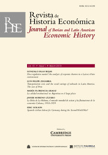
Revista de Historia Economica
Exploring the Nexus of Economics and HistoryRevista de Historia Economica, published by Cambridge University Press, is a distinguished peer-reviewed journal that serves as a vital platform for interdisciplinary scholarship in the fields of Economics and History. With an impressive impact factor and ranked within the top quartiles in its respective categories—Q2 in Economics and Econometrics and Q1 in History—this journal stands as a significant resource for researchers and professionals seeking to explore the intricate relationships between economic phenomena and historical contexts. Covering a timeline of research from 1983 to 2024, it addresses both contemporary and historical economic issues, making it an essential read for students and scholars alike. The journal, although not Open Access, maintains rigorous standards of academic excellence and inclusivity, aiming to enhance the understanding of economic history through comprehensive analyses and innovative perspectives. Its esteemed editorial board and qualitative publications ensure that Revista de Historia Economica is at the forefront of economic historiography, attracting a wide readership base in the United Kingdom and beyond.

Economic History of Developing Regions
Illuminating Economic Trajectories Through Historical Insights.Economic History of Developing Regions, published by Routledge Journals, Taylor & Francis Ltd, is a distinguished academic journal that focuses on the intersection of economic development and historical analysis in emerging economies. Established in 2010, this journal serves as a vital platform for researchers, professionals, and students interested in understanding the economic dynamics and historical contexts that shape developing regions. With its impressive ranking in the Q1 category in History and Q3 in both Development and Economics, it has established itself as a credible source for innovative research and critical insights. Despite being a non-open access publication, it consistently aims to bridge the gap between historical understanding and economic strategies, making it essential reading for those engaged in the studies of economics, history, and development. Emphasizing rigorous academic standards, the journal highlights quality scholarship that contributes to the discourse on sustainable development and policy frameworks essential for evolving economies.

Econ Journal Watch
Fostering Insightful Analysis in the Economics Arena.Econ Journal Watch is an esteemed scholarly publication dedicated to advancing the field of economics through critical analysis and discourse. Established by the Institute for Spontaneous Order Economics, this journal aims to provide a platform for researchers, professionals, and students to examine and reflect on contemporary economic issues and theories. With an ISSN of 1933-527X and an E-ISSN of 1933-527X, it has positioned itself within the competitive realm of economics and econometrics. As part of the Q4 category in the 2023 rankings for Economics and Econometrics, the journal is indexed on Scopus, ranking at #569 out of 716 institutions, placing it within the 20th percentile. Although it currently maintains a non-Open Access model, it offers valuable insights and rigorous analysis from 2008 to 2024, contributing significantly to the discourse in economics. The journal’s commitment to fostering a deeper understanding of economic principles makes it an essential resource for anyone engaged in the economic field.

Asia-Pacific Economic History Review
Advancing Knowledge at the Intersection of History and EconomicsAsia-Pacific Economic History Review is a distinguished journal published by WILEY, focusing on the rich and dynamic intersection of economic and historical perspectives within the Asia-Pacific region. With the ISSN 2832-157X, this peer-reviewed journal stands out for its commitment to open access, ensuring that groundbreaking research is readily available to academics and practitioners alike. As a newly established platform from 2023 to 2024, it has rapidly garnered attention, earning a Q1 classification in History and Q3 in Economics and Econometrics for 2023, reflecting its dual significance in both fields. The journal's ranking within the Scopus database showcases its rising impact, particularly within the top percentile for Arts and Humanities in History. Scholars are encouraged to contribute to this high-quality, interdisciplinary forum that explores the economic histories of the Asia-Pacific region, providing valuable insights and fostering discourse among researchers, professionals, and students passionate about this vital area of study.

History of Economic Thought and Policy
Charting the Historical Pathways of Economic PolicyHistory of Economic Thought and Policy is a vital journal published by FRANCO ANGELI, dedicated to exploring the intersections of economic theory, historical context, and public policy. With ISSN 2240-9971 and E-ISSN 2280-188X, this journal serves as an essential platform for scholars interested in the evolution of economic ideas and their implications for contemporary policy-making. Operating from Italy, it has established a comprehensive framework for interdisciplinary research in the fields of Economics and Econometrics, History, and Public Administration, although it currently holds a Q4 ranking in these categories according to 2023 metrics. The journal already encompasses multiple converging years from 2018 to 2024, underscoring its commitment to timely contributions to economic discourse. It aims to provide open access to its content, fostering a collaborative environment for researchers, professionals, and students keen on enhancing their understanding of economic thought throughout history. Despite its current challenges in Scopus rankings, with notable positions in arts, humanities, and social sciences, History of Economic Thought and Policy remains a promising outlet for significant and critical discussions surrounding the historical pathways that shape today’s economic policies.
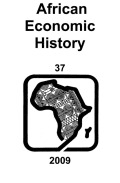
AFRICAN ECONOMIC HISTORY
Decoding Africa's Past for a Prosperous FutureAFRICAN ECONOMIC HISTORY is a distinguished academic journal published by the University of Wisconsin-Madison’s African Studies Program, focusing on the complex interplay of economic and historical dynamics in Africa. With its ISSN 0145-2258 and E-ISSN 2163-9108, this journal has been a vital resource since its inception in 1976, showcasing pioneering research that traverses various periods and regions across the continent. The journal is highly regarded in its field, holding a Q2 ranking in History and a Q4 ranking in Economics and Econometrics according to the latest category quartiles. It remains committed to advancing knowledge through rigorous scholarship while maintaining academic integrity and relevance in an evolving global landscape. Although not open access, it provides critical insights and a platform for discourse among researchers, economists, and historians alike. By delving deeply into the economic factors that shape societies, AFRICAN ECONOMIC HISTORY continues to contribute significantly to the understanding of Africa's past and its implications for the future.

REVUE D ECONOMIE POLITIQUE
Exploring the Nexus of Politics and EconomicsREVUE D ECONOMIE POLITIQUE, published by EDITIONS DALLOZ, serves as a pivotal platform for scholars and professionals engaged in the intricate fields of political science and economics. Established in France, this esteemed journal addresses a wide array of topics pertaining to economic theories, political dynamics, and their interrelations, making it essential reading for those seeking to understand contemporary socio-economic issues. With an ISSN of 0373-2630 and an E-ISSN of 2105-2883, the journal is indexed in notable databases, achieving a category quartile ranking of Q3 in Political Science and International Relations and a respectable standing within other relevant fields. Although currently not open access, it remains a vital resource for researchers and students alike, enriching the academic discourse within its converged years from 1975, 1978, and 2005 to 2024. Positioned in a competitive landscape, with rankings of 442/706 in Political Science and 211/288 in Economics, the journal’s contributions continue to resonate within the scholarly community.
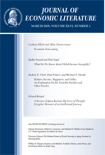
JOURNAL OF ECONOMIC LITERATURE
Empowering researchers with premier economic literature.JOURNAL OF ECONOMIC LITERATURE, published by the American Economic Association, stands as a premier academic journal in the field of economics, with a notable Q1 classification in Economics and Econometrics for 2023. Operating from its base in Nashville, TN, this journal has established itself as an indispensable resource for economic researchers and practitioners alike, boasting an impressive Scopus ranking of 10 out of 716—placing it in the top 2% of its category. The journal's commitment to providing comprehensive critical surveys of the literature enhances the understanding of various economic topics, making it a vital tool for researchers seeking to deepen their knowledge or explore new areas of inquiry. Although it operates on a subscription basis, the journal’s high impact on the economics community underlines its importance in advancing the field. With coverage spanning from the 1980s to the present, JOURNAL OF ECONOMIC LITERATURE continues to encourage rigorous scholarship and bridge theoretical and empirical research, enabling informed discourse among economists globally.
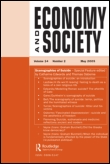
ECONOMY AND SOCIETY
Pioneering Research for a Sustainable SocietyECONOMY AND SOCIETY, published by Routledge Journals, Taylor & Francis Ltd, is a premier academic journal that bridges the realms of economics and social sciences, making significant contributions to interdisciplinary scholarship. Established in 1972 and ongoing through 2024, this journal holds an esteemed Q1 ranking in multiple categories, including Business and International Management, Economics and Econometrics, and History, underscoring its impact within academia. With Scopus rankings placing it in the top percentiles across various fields, ECONOMY AND SOCIETY serves as an essential platform for researchers, professionals, and students to explore critical topics such as economic behavior, societal structures, and historical contexts. Although it does not offer Open Access, its rigorous peer-reviewed articles are instrumental in influencing policy and fostering scholarly dialogue. Explore the full range of issues and contribute to this vibrant academic community focused on the intersection of economy and society.

Journal of the Economic and Social History of the Orient
Charting the Course of Historical Economic and Social EvolutionThe Journal of the Economic and Social History of the Orient, published by BRILL, serves as an essential platform for researchers, historians, and social scientists interested in the economic and social dynamics of the Orient. Since its inception in 1957, this journal has contributed significantly to the understanding of historical economic structures and societal transformations, offering insights that engage a wide academic audience. With an ISSN of 0022-4995 and an E-ISSN of 1568-5209, the journal maintains a reputation for quality scholarship, as reflected in its Q2 ranking in History and notable standings in the fields of Sociology and Economics. Although it is not an open-access journal, it ensures accessibility to vital research through institutional subscriptions. By exploring diverse topics within the realms of economics, sociology, and history, the journal plays a crucial role in fostering academic discourse and enhancing knowledge regarding the complex historical narratives of the Orient.